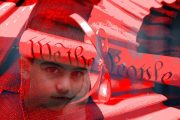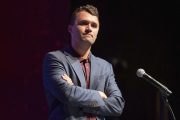If ideas are also subject to the survival-of-the-fittest principle, is evolution doomed to extinction? This question is again raised now that yet another scientist has questioned Charles Darwin’s famous 19th-century theory.
At issue is the new book Foresight: How the Chemistry of Life Reveals Planning and Purpose, which has been endorsed by three Nobel Laureates. It was authored by a Dr. Marcos Eberlin, who himself has some weighty credentials, as he is “a physical chemist who specializes in spectrometry and supervises a large lab in Brazil that has produced hundreds of doctoral-level scientists, is former president of the International Mass Spectrometry Foundation and author of more than 1,000 research papers,” writes attorney and medical doctor John Dale Dunn at American Thinker.
Dunn explains that Dr. Eberlin “studies the molecules that make up those really small things — one more level down into the make-up of cells, to the biochemical level of anatomy and the level at which atoms and molecules combine to make more complex molecules that have biochemical roles in the physiology of the cell.”
In other words, Eberlin studies life on a micro level that Darwin, who, having died in 1882 and never having benefitted from modern marvels such as electron microscopes, could scarcely understand. “Darwin knew little about cellular anatomical and physiological complexity,” writes Dunn, illustrating the point. “Certainly, he knew less about the multicelled and the higher forms of living things that display not only complex cellular functionality, but also incredible cellular diversity.”
It’s much like the difference between someone who never looked under a car’s hood and just knows how to turn the ignition key and an engineer who has studied in detail the vehicle’s inner components. Who’s going to know more about auto production?
Eberlin’s thesis is that life is too complex to be an accident, that “artful solutions to major engineering, chemistry, and biology in living cells of living things … are evidence of a factor of foresight and intelligence,” as Dunn puts it.
To use a common example, if you flew over a beach and saw the letters “SOS” formed with stones, would you even for a moment entertain the notion that the waves somehow, over time, might have accidentally assembled them in just that fashion? In this vein, would we ever think a car, computer, or airplane would be created via “cosmic accident”?
Now consider that a human being, or even a cow, involves far more complex design than any of the above — and that design implies a designer.
Dunn also writes that “Dr. Eberlin runs through a wonderful series of discussions that make his case for design and not chance (Darwin’s theory is built on chance and random events),” and then provides a list:
1. The complex functionality of membranes.
2. The ideal components and proportions of the atmosphere.
3. The genius make-up of genetic material, DNA and RNA.
4. Gene controls — operons.
5. The magic of enzymes — they are made to work.
6. Chaparones [sic] and chaparonins that modify and maximize protein synthesis and benefits.
7. The special activities and makeup of bugs, bacteria, and carnivorous plants.
8. Birds and their sense of direction.
9. The extraordinary nature of bird eggs and bird gestation.
10. The special provisions that are essential for human reproduction.
11. Special provision for sight.
Below is a recent interview in which Dr. Eberlin discusses his thesis:
In summary, “Chemicals don’t have a brain, can’t organize complex functionality; they just get pushed around by electric magnetic physical forces,” Dunn also explains. “It is silly to propose that random chemical changes that occasionally find a survival benefit can create complex functionality of the magnitude described in any cell, much less the many living single to multi-celled and of course the higher forms of life.”
Or as I put it in my 2008 essay “Intelligent Design and Evolution,” the
process by which life began in the primordial soup would have to be called “abiogenesis,” which, as Thomas Henry Huxley said, is the “doctrine that living matter may be produced by not living matter.” The idea is that amino acids formed chains and became the first proteins which, after many more evolutionary twists and turns, became the first simple organisms. And from there life continued developing and increasing in complexity. Yet this poses a question: how is it that chemicals can suddenly “decide” to become alive?
Moreover, even if they somehow did, why would they have a will to continue living and become more complex?
A note to those on “both sides” of this issue: My essay is long and, I’d say “balanced,” questioning the prevailing evolutionary school of thought while allowing that evolution could be an “expanded,” step-by-step view of how God created life (remember that God is outside of time; to Him, everything is “now”). The essay also explains how this could accord with the biblical creation story. I hope readers will consider it with an open mind and eye toward Truth.
Unfortunately, this rarely happens. As New York University law and philosophy professor and avowed atheist Thomas Nagel himself once lamented, addressing evolutionist intransigence, “The political urge to defend science education against the threats of religious orthodoxy … has resulted in a counterorthodoxy, supported by bad arguments, and a tendency to overstate the legitimate scientific claims of evolutionary theory.”
Dr. Nagel makes the case that a responsible discussion of evolutionary theory — including in schools — must involve the legitimate objections of Intelligent Design proponents. Without that, one might say, a curriculum isn’t intelligently designed at all.
Image: screenshot from YouTube video
Selwyn Duke (@SelwynDuke) has written for The New American for more than a decade. He has also written for The Hill, Observer, The American Conservative, WorldNetDaily, American Thinker, and many other print and online publications. In addition, he has contributed to college textbooks published by Gale-Cengage Learning, has appeared on television, and is a frequent guest on radio.




